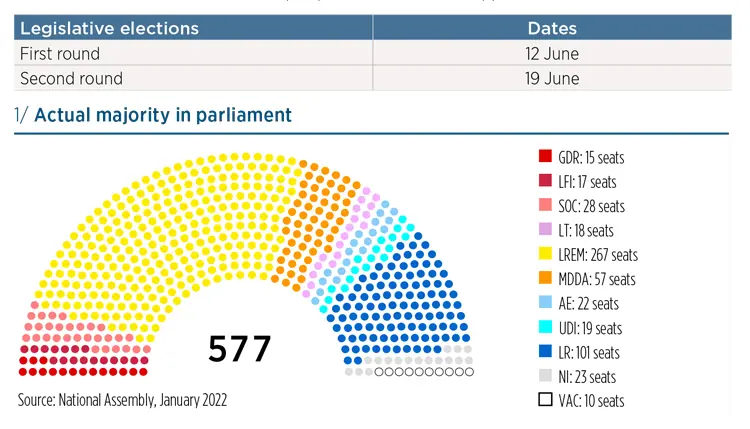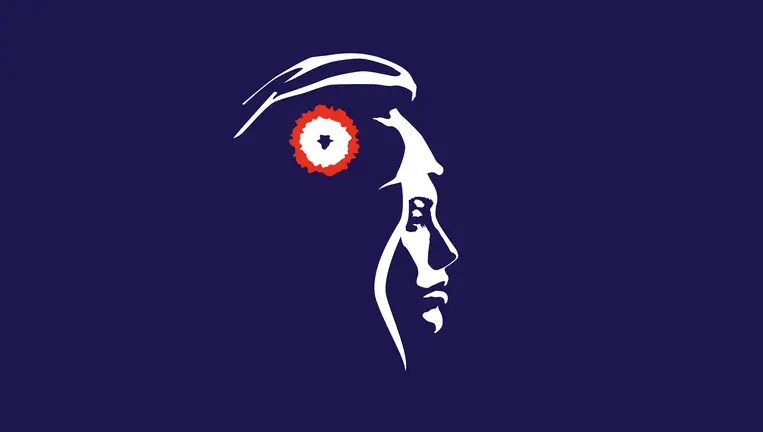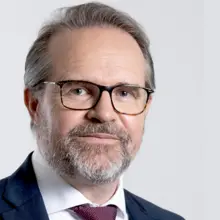Summary
The French 2022 election cycle is starting in the context of the war in Ukraine which favours to the incumbent president. Structural reforms, notably of the pension system, and the energy transition are debated but the main topic is household purchasing power as energy and food prices are hurting low income households. The electoral turnout might be very low which usually helps far left or right candidates.
With Emmanuel Macron’s entry into the presidential race, the French electoral cycle has finally begun, and will end with the legislative elections on 19 June. For the first presidential election round, scheduled for 10 April, the incumbent is polling ahead with 30% of the vote, far outpacing Marine Le Pen, who is closer to the 20% mark. Three other candidates are vying for second place in the first round: far-left candidate Jean Luc Mélenchon, who is attempting to rally a divided left behind his banner; the centre-right candidate Valérie Pécresse, whose campaign has lost momentum over the past weeks; and at the far right, political pundit Eric Zemmour, who has managed to win part of the conservative and identity politics vote. At this stage, none of them appears poised to beat Emmanuel Macron in the second presidential round of voting.
In contrast to 2017, no candidate with any chance of winning the presidency is suggesting a French withdrawal from the Eurozone, or “Frexit”. This electoral cycle is therefore unlikely to generate much volatility on the financial markets, in particular the bond markets. In addition, in spite of their ideological differences, the major candidates are all facing a need to restore purchasing power to households in a context of strong inflation and great uncertainty due to the war in Ukraine. Geopolitical tensions have clearly changed the campaign narrative as most candidates had to align themselves behind the incumbent president in opposing the Russian aggression and supporting French diplomatic efforts.
On the economic front, Emmanuel Macron’s programme appears to be a continuation of the previous five years, with around €15 billion more in tax cuts, increasing the legal retirement age to 65 for people born after 1969, work incentives and a reform of the jobs centre (Pôle Emploi), as well as a programme of investment in the energy transition (nuclear and wind energy) and in the army. Most of the public investment projects were presented last October at the launch of the “France 2030” plan.
The French election cycle
French electors will first vote for the president in a two-round election1 . Then, two months later, 577 MPs from the lower house (Assemblée Nationale) will be chosen in two-round local elections, which will define a majority either directly issued from the new elected president party or via a coalition. Both president and MPs serve a five-year term. The elected president will then appoint his prime minister, who will present himself and his government to the Parliament for a vote of confidence.
Presidential elections
Twelve candidates have been approved by the Constitutional Court and will run in the first round.

Household purchasing power has become the main theme of the campaign
Comparing the main candidates’ manifestos
Note: We focus only on the platforms of candidates who are polling above 10% and highlight the parts of their platforms with economic and financial implications.
Although they disagree on the solutions, all candidates have the common objective of protecting or increasing low- and middle-income household purchase power, which has been hurt badly by rising energy and food prices.
The retirement system is also at the heart of the debate, including for the incumbent president, who did not manage to implement his reform in his previous term. Finally, candidates want to rebuild French industrial capabilities and ensure a smooth energy transition but disagree on how to do so. However, a consensus has arisen from centre to far right to restart the nuclear power programs.
Candidates are ranked in alphabetic order
- M. Le Pen
- Change the wealth tax to focus on financial assets and exclude real estate
- Reduce VAT on energy from 20% to 5.5%
- Increase base salaries by 10% by reducing corporate charges
- Retirement age at 60 years for those who have worked for 40 years
- Stop windfarm development and focus on nuclear, hydroelectric and hydrogen
- Change the wealth tax to focus on financial assets and exclude real estate
- Prioritise French SMEs
- Create a French sovereign fund
- E. Macron
- Has the most pro-European program
- Push the retirement age from 62 years to 65 years
- Reduce taxes, including the end of non-profit-based corporate taxes (estimated at €6bn)
- Amend inheritance tax system to favour direct and indirect wealth transfers
- €30bn in investments to support the energy transition and the French industrial sector
- Financial support and innovation for agriculture
- Reform of unemployment benefits
- Reform of social benefits to reduce red tape and improve their efficiency
- J-L. Mélenchon
- Increase the minimum wage and the public-sector base salary index
- Change the retirement age to 60
- Universal benefit s financed by an inheritance tax (100% above €12m)
- Revive the wealth tax, including in financial assets
- Reduce taxes for low and middle incomes
- Significant public investments and subsidies for the energy transition (€45bn per year)
- V. Pécresse
- Increase net salaries by 10%, no payroll taxes on hours worked above 35, transfer of holidays (RTT) into income
- Extend family benefits and exempt single-mother pensions from taxes
- Exempt 95% of households from the inheritance tax
- Reduce taxes for households
- Reduce taxes for corporates by €10bn
- New saving products to raise €120bn and fund the energy transition
- Launch a European carbon tax
- Increase the Justice budget
- E. Zemmour
- Reduce taxes by €70bn, including lowering production taxes by €30bn and the SME corporate tax by 15%
- Reduce taxes on low salaries
- Tax exemption and making employees benefits available to boost consumption
- Exclude the main residence from the actual wealth tax
- Reduce the inheritance tax
- Move the retirement age to 64 years after 2030
- Focus on nuclear power to ensure the transition to net zero
Candidates disagree on the retirement system reform
Parliament elections
Following the presidential election, the lower house will be renewed. Since 2017, the government majority has been based on a three-party coalition between LREM Emmanuel Macron’s party, the Modem and Agir. In the event of a second term for Emmanuel Macron, a similar coalition is likely and would include the party of former Prime Minister Edouard Philippe, Horizons.

Latest polls are showing Emmanuel Macro is leading the first round
The incumbent president is leading the polls for the first round, with a wide margin at 30-32%. Marine Le Pen comes next, at close to 20%, while three candidates (Mélenchon, Pécresse and Zemmour) are polling close to 10. This means that the remaining seven candidates are sharing 20% of the votes and have at this stage a very low probability of reaching the second round. Polls are showing voters are highly undecided, and turnout might be very low, which could favour the far-right or far-left candidates.
Polls suggest E. Macron would win against all candidates in a second round

Second round
Polls are showing that Emmanuel Macron would win against all candidates in a second round by a wide margin. However, given the large number of uncertain voters for the first round, second-round intentions have a low predictive power.


